#intersectional counseling
Explore tagged Tumblr posts
Text
Mindful Activism: Balancing Mental Health with Advocacy Work

Activism is often born out of a deep sense of injustice and a desire to create meaningful change. For many people with marginalized identities, this work is not just a choice but a necessity. Advocacy becomes a way to challenge systemic inequalities and fight for the rights and dignity of those who have been historically oppressed. However, because activism work is never-ending, it can take a toll on mental health. The emotional labor involved, coupled with the constant exposure to trauma, can lead to stress, fatigue, burnout, anxiety, hopelessness, and depression (Underwood, 2023). This is where mindful activism comes into play—a practice that prioritizes mental wellbeing while continuing the crucial work of advocacy.
Understanding the Emotional Weight of Activism
Activism is often emotionally charged. Whether protesting in the streets, organizing community events, or engaging in online advocacy, activists frequently confront painful realities. The weight of these experiences can be overwhelming, especially when change is slow, or the systems in place seem insurmountable. For activists from BIPOC, LGBTQ+, and other marginalized communities, the struggle is even more personal, as the issues they fight against often directly affect them or their loved ones. In addition to fighting systems of oppression, they’re also personally facing these same systems daily.
This emotional labor, while necessary, can lead to significant mental health challenges. Activists may experience feelings of helplessness, frustration, or anger. The constant exposure to injustice can also trigger trauma responses, particularly for those who have experienced similar forms of oppression. Without proper mental health care, these feelings can accumulate, leading to stress, anxiety, depression, or burnout (Underwood, 2023).
The Importance of Mindfulness in Activism
Mindfulness is the practice of being fully present and aware of one's thoughts, feelings, and surroundings without judgment. In the context of activism, mindfulness can serve as a powerful tool for maintaining mental health. It allows activists to recognize when they are feeling overwhelmed or emotionally drained and to take steps to care for themselves before burnout sets in (Gertjejanssen, 2021).
Incorporating mindfulness into activism can take many forms. For some, it might involve regular meditation or breathing exercises to help manage stress. For others, it could be about setting boundaries—knowing when to step back from advocacy work to recharge. Mindfulness also encourages activists to focus on the present moment, which can help reduce feelings of helplessness about the future. To learn more about mindfulness, see our previous blog post on how mindfulness can improve mental health.
Balancing Advocacy with Self-Care
One of the most important aspects of mindful activism is recognizing the importance of self-care. Advocacy work is often seen as selfless, with activists dedicating their time and energy to others. However, it is essential to remember that self-care is not selfish. In fact, taking care of oneself is crucial for sustaining long-term activism. Self-care and wellness are forms of resistance necessary for survival (Pitts, 2023).
Self-care can be as simple as taking breaks, engaging in hobbies, or spending time with loved ones. Self-care can also involve professional mental health support, such as therapy or counseling, to process the emotional toll of advocacy work. By prioritizing self-care, activists can ensure they have the energy and emotional resilience to continue their work (Pitts, 2023). To learn more about self-care, see our previous blog post on why self-care is important.
Creating a Culture of Support
It is important for activist communities to create a culture of support where mental health is prioritized. This can involve checking in on fellow activists, offering support when someone needs to step back, and creating an environment where discussing mental health challenges is okay. By building a supportive community, activists can help each other navigate the emotional challenges of their work.
Mindful activism is about balancing the urgency of advocacy with the necessity of mental wellbeing. Mindfulness and self-care practices can help activists sustain their efforts for the long haul while protecting their mental health. After all, a movement is only as strong as the individuals within it, and ensuring the wellbeing of those individuals is vital to creating lasting change.
Contact Us
#mental health#individual counseling#mental health counseling#intersectional counseling#trauma#mental heath support#mindfulness#stress#self care#therapy
0 notes
Text
Tumblr is currently serving me an ad for "Voda, the LGBTQ mental health app" offering "daily meditations, self-care and AI advice" and as a therapist I am begging you not to download an app where an AI tries to help you with your mental health. Please do not. They tried to have an AI chatbot counsel eating disorder patients and it told them to diet. That shit is not safe. Do not talk to an AI about your mental health please. You don't need to talk to a professional but talk to a PERSON. Edited to add: OK, it's been a long day and I wrote this when I only had the information that was in the ad. It looks like they may not actually have a chatbot, but something that just... churns out pre-programmed advice? That's genuinely a lot safer! But calling it "AI advice" feels a little misleading. This app may be perfectly fine and safe to use, but should probably stick to the fundamentals that people want from a mental health app and not try to use AI hype to market, since the intersection of AI and mental health support is VERY DICEY and bad shit has happened there before. And you should probably do further research on how they are using your data, since that is also an area where mental health support apps have gone bad before.
54K notes
·
View notes
Text
Fuck Trump, here’s all the civil rights orgs I know:
(Most have education pages and/or socials to follow and boost if u can’t donate right now)
LGBTQ+
Trevor Project—queer crisis hotline/counseling (NOTE THAT THEY CALL POLICE IN CERTAIN SITUATIONS)
List of Crisis Hotlines/etc compiled by Inclusive Therapists .com which DON’T CALL POLICE
Point of Pride—helps trans folks having trouble accessing gender affirming healthcare
Trans Lifeline—community support/resources/financial aid for trans folks
REPRODUCTIVE RIGHTS
National Network of Abortion Funds—financial assistance/transport/childcare for people in ban states seeking abortions.
Brigid Alliance—same
Sister Song—reproductive justice for WOC
Indigenous Women Rising—helps Indigenous families access abortions/menstrual hygiene/midwifery/etc
Afiya Center—reproductive justice/HIV care for Black womxn in Texas
Abortion access orgs for Americans in the
Midwest
South
Appalachia (they also offer free emergency contraception/support services/etc)
RACIAL JUSTICE
NYU Law Center on Race Inequality—self-education resources on racism & antiblackness/how to contact elected officials/how to protest safely.
List of orgs protecting Black Americans, compiled by NYU (incl NAACP, Audre Lorde Project, BLM, Black Voters Matter, etc)
National Immigration Law Center—fighting for asylum seeking/DACA; helping immigrants access healthcare/worker’s rights/etc
American Civil Liberties Union—working on many intersectional initiatives
Southern Poverty Law Center—same
GLOBAL AID (While we Americans wait for shoes to start dropping, let’s not forget others in need, and that Trump’s atrocious foreign policies will affect everyone!)
World Central Kitchen—hunger relief
Action Against Hunger—same
War Child—supports and educates children in conflict zones, like Yemen and DRC
Medecins Sans Frontieres— medical aid
Islamic Relief USA—emergency aid
PALESTINIAN AID
Palestine Children’s Relief Fund— medical aid for kids
Anera— emergency relief & long-term development resources for Palestine, Lebanon, Jordan
United Nations Relief and Works Agency—aid for Palestinian refugees in Lebanon/Syria/West Bank/Gaza/Jordan
Palestine Red Crescent Society—medical aid
SUDANESE AID
List of humanitarian orgs working in Sudan, compiled by 500 Words Magazine
CONGOLESE AID
Panzi Foundation—supports assault survivors & their families
Eastern Congo Initiative—supports ands funds local/community-based Congolese efforts
Please reblog, & add any legitimate humanitarian organizations you know of! I love all of you!!
#donations#resources#election 2024#lgbtq#reproductive rights#reproductive justice#racial justice#blacklivesmatter#trans pride#queer pride#all eyes on palestine#all eyes on sudan#all eyes on congo#free yemen#social justice#dm me//add in your own reblog any other relevant tags
185 notes
·
View notes
Text
Jade Mountain Academy students
#6 - Skywing chapter
I like Skywings a lot actually. I think they were underutilized in the story. And then there is Flame. Poor, lovable Flame. One day I would like to write a more in-depth think piece on him, his character, and his role in the story. But not today, so here are some Skywings:
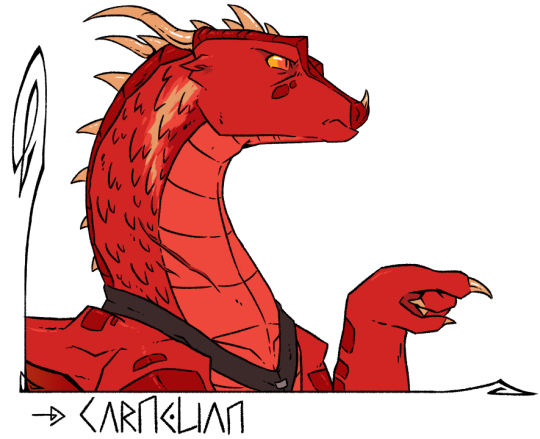
Carnelian
Tribe - Skywing
Winglet - Jade
Color - Tomato red
Relatives - none on site
Clawmate(s) - Moonwatcher (Nightwing), Kinkajou (Rainwing)
Favorite subject - Exercise
Least fav. subject - Science
Physical characteristics - tan horns, bendy; banded markings running down upper neck; light to medium scarring across face, neck, and limbs; medium to large stature, well-defined musculature
Other characteristics - selectively uncooperative, refuses to do assignments that annoy her (monitor for now); abrasive, three reported threats of violence against students (monitored, suggest expanding physical extracurricular options to burn off excess energy); appears to respond well to praise
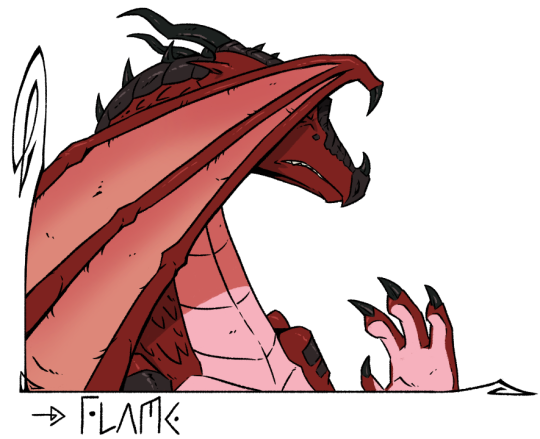
Flame
Tribe - Skywing
Winglet - Gold
Color - Crimson red
Relatives - none on site
Clawmate(s) - Bigtail (Nightwing), Pike (Seawing)
Favorite subject - did not disclose
Least fav. subject - "All of them"
Physical characteristics - double-bent horns; black dorsal plates and accents; large, jagged scar running across left side of the face, intersecting the eye; blind in left eye; medium size with thin, wiry frame
Other characteristics - very uncooperative, refuses to do assignments and has poor attendance record (monitored, suggest counseling, consider withdrawing from student body if behavior does not improve); emotionally volatile, does not like eye contact, will react with hostility if stared at or if facial scar is mentioned (suggest counseling); shows signs of post traumatic stress and severe self image issues (suggest counseling); has turned down counseling offer (give space for now, ask again later)
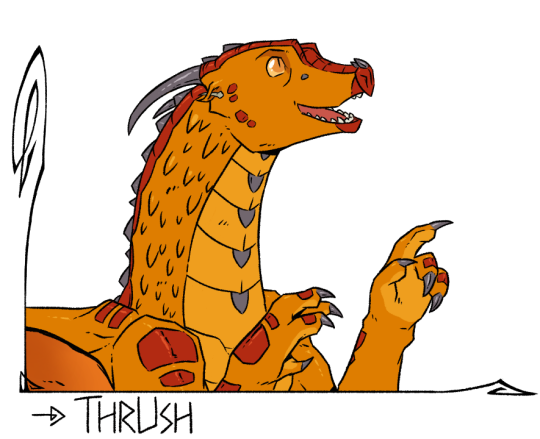
Thrush
Tribe - Skywing
Winglet - Silver
Color - Apricot yellow
Relatives - Peregrine (cousin)
Clawmate(s) - Changbai (Icewing), Boto (Rainwing)
Favorite subject - History
Least fav. subject - Anatomy
Physical characteristics - straight horns; row of dark scales running down ventral side of neck; beak-like mouth; smallish stature, small-boned
Other characteristics - decent work ethic; very energetic, difficulty to sit still; eager to prove personal competence; frequently interrupts people while they're speaking (suggest guidance and monitoring)
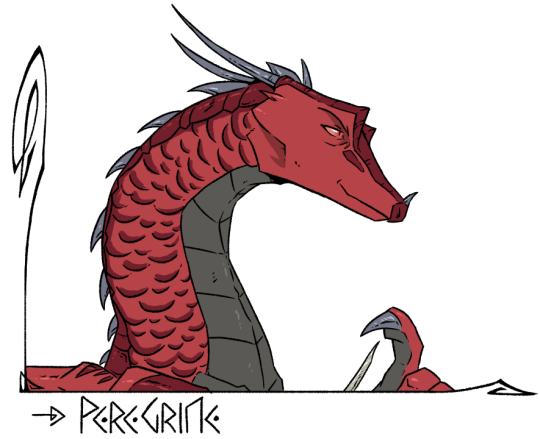
Peregrine
Tribe - Skywing
Winglet - Copper
Color - Brick red
Relatives - Thrush (cousin)
Clawmate(s) - Pronghorn (Sandwing)
Favorite subject - Anatomy
Least fav. subject - Art
Physical characteristics - dark-colored stripe patterns running down the side of the neck; long limbs; medium to large stature with slender features; deaf in left ear
Other characteristics - practically-inclined; morbid sense of humor; tends to play with food before eating; owns a collection of small, sharpened animal bones (has been instructed not to bring them to class); expressed interest in a class/seminar about medicinal herbs

Garnet
Tribe - Skywing
Winglet - Quartz
Color - Amaranth red
Relatives - none on site
Clawmate(s) - Siamang (Rainwing), Arid (Sandwing)
Favorite subject - History
Least fav. subject - Cultural Exchange
Physical characteristics - sharply bent horns curving inward; ridge of thorn-like spines running from nose down to tip of tail; light scarring across ventral side; large frame with well-defined musclulature
Other characteristics - morose; does not like loud noises or crowds; prefers to eat alone; longest fire-breathing distance; notable age-gap to rest of winglet (no issues so far, but continue to monitor social integration)
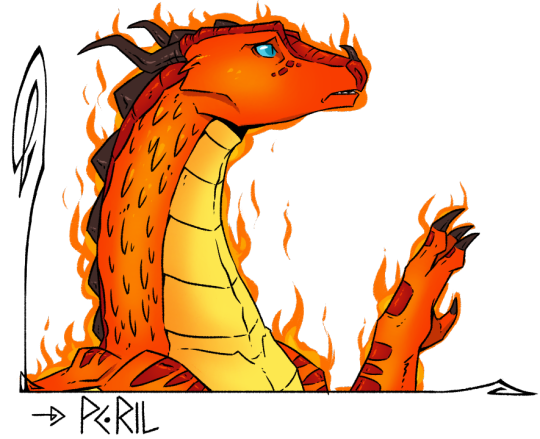
Peril
Tribe - Skywing
Winglet - not assigned
Color - Tiger orange
Relatives - none on site
Clawmate(s) - none
Favorite subject - class attendance suspended
Least fav. subject - class attendance suspended
Physical characteristics - afflicted with firescales, body emits dangerous levels of heat at all times; scales show faint fiery glow like embers; bright yellow vein-like pattern spread through wing membranes; bright blue eyes; tall stature, very thin
Other characteristics - CAUTION! Do not come in physical contact with her, severe burn hazard; instruct student body to keep minimum distance; be mindful of surfaces she was in prolonged contact with, as they could carry residual heat; keep away from flammable areas; we don't know what to do with her yet, for now just give her a place to sleep and eat
#wings of fire#dragon#wof#digital art#wof art#flawseer art#wof skywing#wof carnelian#wof flame#wof thrush#wof peregrine#wof garnet#wof peril#jade mountain academy
575 notes
·
View notes
Text
thoughts on the chapter
“these differences, both internal and external, allow us to run towards other people and search for a point of intersection” kid out of 8 chapters you spoke like 5 sentences to Shigaraki. What intersection. (I know, I know - the crying child. the only thing Deku can care about.)
Aizawa and Mic visiting Shirakumo's grave
Compress reading Spinner's book with a sad smile...
Did villains just magically stop appearing? because AFO is gone? Because everyone is a bit nicer to each other? Because the rankings got expanded and now everyone wants to get the Eiyuu title?
Shoji says "This award goes to those who rose up 8 years ago." GEE SHOJI. I WONDER WHO IT WAS THAT GOT THEM TO SHOW UP IN THE FIRST PLACE.
I know he's thinking of the heteromorphs that stopped that day. But i just. can't get over the fact that it was Spinner's call to action that inspired them first to even come out.
"peacefully resolving prejudice-based incidents in the rural areas" Peacefully telling a man to put down the rake they're about to hit a heteromorph child with.
I know the intention is de-escalation or something. And that's a good thing! Ideally I don't want the man holding the rake to be smashed into the ground. I don't want the dumbasses spray painting slurs on a wall to be punched around. But the word peaceful here feels like it implies that... it would be victim's fault if they use force to resist violent discrimination. Equal responsibility on all parties and it's up to Shoji, it depends on Shoji to resolve it nonviolently. The originator of the violence doesn't enter the equation.
idk. rubs me the wrong way.
Did Shoji resolve the heteromorph riot peacefully? Not really. He fought Spinner (ah, you might say - well, Spinner was using violence! Shoji has to react to that with punching as well! Yeah. That's what I mean.) Koda had birds shoved someone off a building. What actually stopped everything was one rioter feeling doubts. It's credited to Shoji's words, but Shoji also admits that it's good they showed up and in the chapter here, he calls it an "uprising".
And they showed up because of Spinner.
Well. Maybe Shoji turned to "peaceful resolves" afterwards.
Just to clarify so that no one misunderstands me. Peaceful resolutions are good. I'm glad that's how Shoji is stopping anti-heteromorph incidents. What I dislike is the shallow framing.
"Quirk Counseling Expansion Project" EXPANSION???
Toga became the way she was because she didn't go to Quirk Counseling enough. Needed Expansion. The counselor saying she'll make Toga "nice and normal" didn't go far enough. Needed Expansion.
Again, I get that probably reform is implied in that, or the intent is probably expanding the concept/ideas/tools/methods/scope to include better methods. But wow.
All Might + Crowd of Supporter Statues is the creepiest thing I've ever seen.
Story literally breaking the ending fourth wall to give a happy ending to Deku.
I expect the volume extras to have Shigaraki to come and decay the ending and rescue the league.
It's amazing how the answer to "can someone quirkless be a hero" is a NO. Because Deku's feeling sad and lonely being quirkless and just a teacher and saving a kid from tripping and encouraging a future student. It's not enough. It's not Heroism. So he gets a support item and gets to be a Hero again
And then Shigaraki's Star Wars ghost is just there, not tied into the theme happening on page because Deku failed to saved the fucking guy, but he remembers Shigaraki. for one panel.
Just to repeat this because it's hysterical: This ending is "Can a quirkless person be a hero (and be happy and feel worthy?)" We get a gentle bittersweet but resounding NO. Until All Might comes again to help him out with a 'gift'.
"Remember that day when I used support items to inject acid into an immortal child demon on global TV? The day that you killed a man? Well, data from that day made you this support item. Use it to be a Hero."
Also being a quirkless Hero after all depends on knowing people and having lots of money.
All Might is now about 64 years old.
Shigaraki ghost...........
Something about shigaraki in his original outfit has me all choked up.
That's the appearance he chose to present as in the vestige realm before he disappeared.
The appearance he had in that flashback of him and Spinner bonding over games.
I like how Deku looks back, sees the ghost, but then turns forward and smile. Not even a smile as he's looking at shigaraki. I know this is nitpicky. jfc tho.
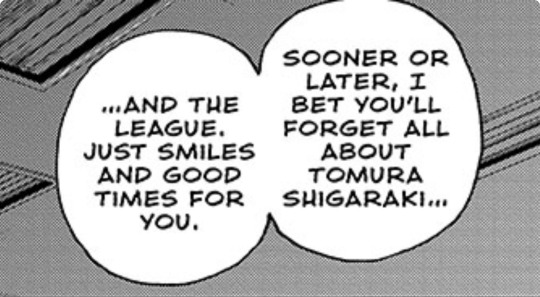
"You already destroyed it"/"That depends on what you guys do from now on." I see that there's barely any credit to Shigaraki forcing this amount of change in this chapter. As far as I can see, Deku barely thinks about Shigaraki or even Tenko this chapter. Shigaraki's just a ghost hidden vaguely in all this.
"I'll never forget" lol. The ghost is just like an afterthought from the story to make sure Deku keeps his 'promise'
I don't think a single villain's name is mentioned here. Not a single League member's. Uravity's work towards quirk counseling is not publicly or explicitly credited to her experience with Toga (the vaguest of implication). We don't know Dabi's fate and Shouto is only known as "Endeavor's son" - which might be good? because it's Endeavor's who was the main perpetrator, but still. Spinner lead the uprising but Shoji doesn't mention that. Spinner wrote his book but there's no impact, except for making Compress smile sadly and that's it. Twice has been long forgotten. Deku thinks of Shigaraki's words at the beginning of the chapter, then sees his ghost at the end, but otherwise, nothing.
Truly they've been swept under the rug. A lid put over everything.
Whatever!!!! Shigaraki and the League - the absolute best part of bnha.
108 notes
·
View notes
Note
what’s the spoiler for the final chapter? 🤡
It's a lot of dumb stuff so I'll just focus on the lov, which technically isn't a lot because we don't get any actual info on them.
First of all, there is a time skip of 8 years.
There is a tiny panel of Spinner's book, which is simply titled "League of Villains", next to it is a panel of Compress reading it (where? We don't know). And Shigaraki appears as a ghost in front of Deku in one panel but he just stands there 🕴️without saying anything. Aizawa and Present Mic are seen praying at an altar, suggesting that Kurogiri died (EDIT: it could also be Midnight or anyone else because they don't mention who they're visiting exactly). Ochako started some kind of quirk counseling project (in honor of Toga I guess).
No one actually mentions the lov in any way shape or form.
The chapter starts with the quote from the first chapter: “People are not born equal. Each of us has a different form or shape but, despite of that, we still care for others. And these differences, both internal and external, allow us to run towards other people and search for a point of intersection”
And ends with: "This is the story of how we will continue to reach out."
While these quotes are supposed to come across as inspirational, they ultimately feel shallow as the heroes that committed crimes are continuing to live life while their victims are either dead and/or their ending not even explicitly stated. There is one panel of Endvr in his wheelchair, surrounded by Hawks and his sidekicks, Shouto is a pro hero who is being called Endvr's son less and less these days.
This story about caring and reaching out unfortunately failed at getting anywhere with that as the people that needed help ended up dead/in prison/probably dead.
So while we spent so long arguing about whether Touya would live or die, Horikoshi simply decided to give us the middle finger by not showing him or revealing what happened to him. Is he alive? Did he die? Kurogiri at least had people come visit his altar, however, what happened with Touya, how long did he live if he died, what became of his relationships with his family members? That and more we will apparently never know because why would any of that even matter, right?
Essentially, Horikoshi should've just killed him at the end of the second war and let him go out on his own terms instead of keeping him alive for... what?
64 notes
·
View notes
Text
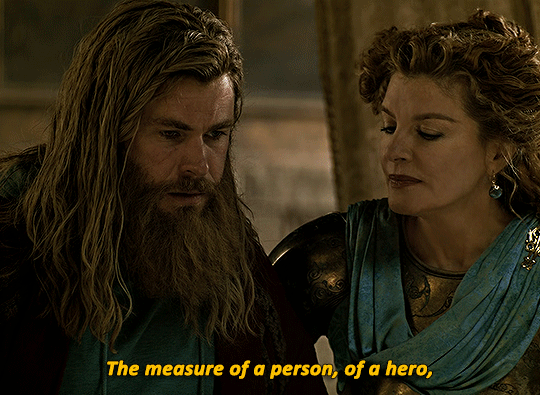
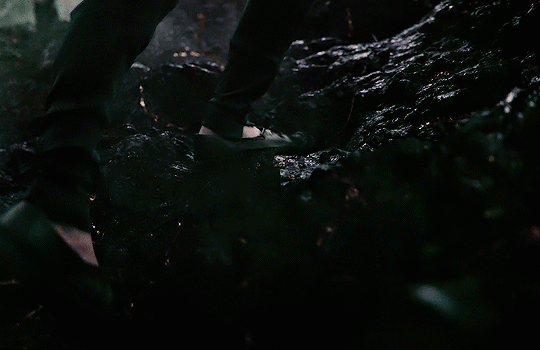
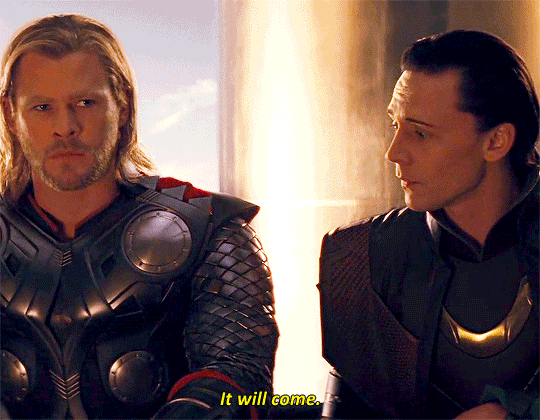
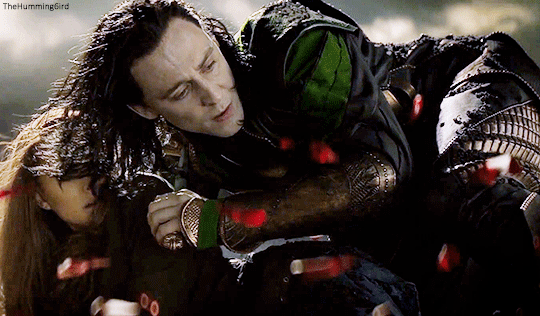
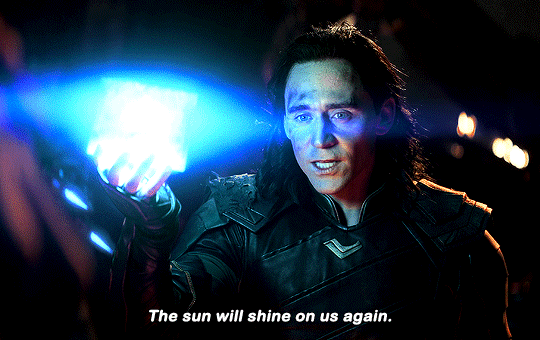
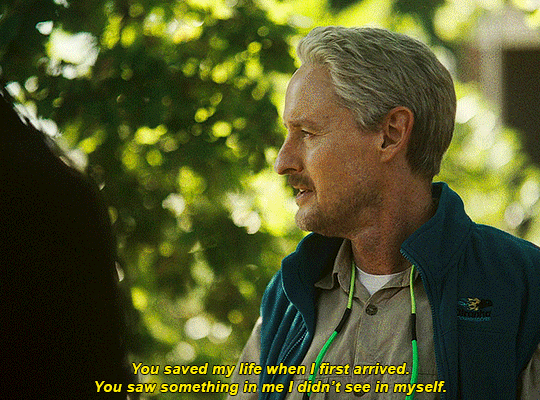
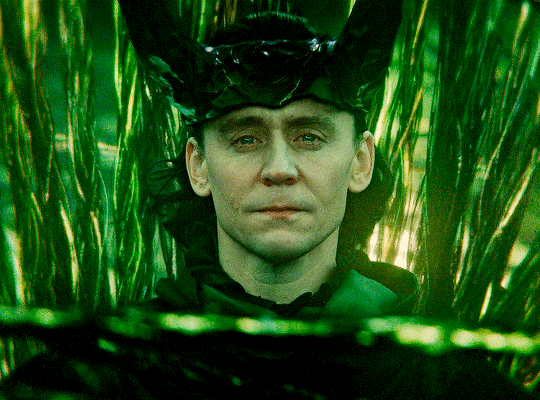

It troubles me when fans find Loki in his own tv series "out of character". Since the first Thor movie, Loki has shown a certain sweetness, protectiveness, and level-headedness that was overcome and eventually self-suppressed by rage and tragedy. He didn't have an environment in which he could thrive and, in Frigga's words, succeed at being who he truly is.
Loki desperately needed a support system outside his immediate family. That support system simply couldn't have been built on Asgard because of:
1. Odin's political machinations, including the intentional creation of an environment rife with sibling rivalry and blatant favoritism.
2. The racist if not xenophobic views of Asgardians.
3. The inherent masculine-dominant, warrior society culture of Asgard.
To break Loki out of his self-destructive patterns, it took the empathy of 1 brainwashed and memory-wiped TVA analyst to rightly recognize that Loki as a person has incredible potential and that he could actively do something about it. That Mobius uses this reasoning for the advantage of the TVA (then under HWR's helm) is a plot point I'll discuss later, but the fact still stands: Loki was given a second chance to be who he really is because of the choice Mobius made to intervene. Loki would have been pruned before he would have had the opportunity to meet Sylvie, B-15, Casey, and OB. This is fact.
Mobius literally drops everything--the case he's actively investigating--to intervene. The fact a minuteman immediately reports the variant of Loki he is most interested in has been taken into custody suggests that Mobius has been planning this intervention for some time.
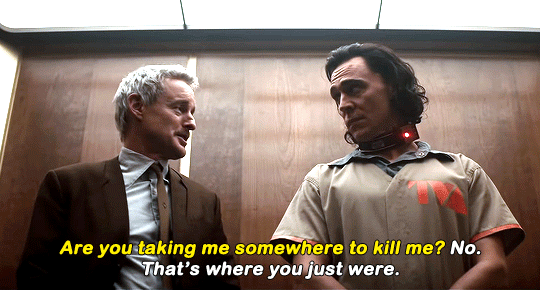
Some fans hate Mobius for his treatment of Loki in the first episode. It is, indeed, manipulative, condescending, and to a certain extent, emotionally abusive. I'm not denying any of this, but from a narrative perspective, Mobius, to be a fully well-rounded character, necessarily must have his own flaws and personal conflicts to battle. Loki's evolution as a character, and thus his positive impact on others, would be missing an emotional beat of mutual reciprocation otherwise. That emotional beat pays off in every episode of S2, culminating in the final scene of the final episode. This is to say nothing of the likelihood that Loki would not have been receptive to any form of gentleness at that point in time to begin with.
Crucially, Mobius gets Loki to admit that his villainous persona is exactly that: an illusion constructed in a bid for control. Some viewers might interpret this scene as a shortcut for getting Loki to behave "out of character" by S1E2, but Thor 2 proves otherwise:

This scene with Thor demonstrates that Loki has a high pain tolerance and is adept at hiding pain. His need to mask his vulnerability, and how that vulnerability is intrinsically tied with the misplaced shame of who he is, resonates deeply with queer, people of color, immigrant, colonized, and adopted fans, many of whom have intersectional lived experiences (including myself). I believe it is for this reason that so many of us are desperate for blatant representation in mainstream entertainment, and to shame us for the sin of hoping is disturbing.
But I digress. Frigga, Thor, and now Mobius are among the few who can see through Loki's deception. That deception has the unfortunate effect of hurting not only innocent civillians but his loved ones and himself (closeting, internalized racism).
Once Loki is able to drop that persona through admission, however, he is able to relax and be himself in the TVA. And in being himself, Loki is consequently able to love himself, which manifests through loving Sylvie. S1 shows Loki holding her up on a romantic pedestal: he chases after her, he sings a song for her, he wants her to be okay. He loves her, yes, and though it appears she does not reciprocate (in my opinion, your mileage might vary), Sylvie does love Loki enough back to buy him a drink and counsel him about what he really wants. This scene is critical in Loki's development in the same way Mobius sheds light on his potential to be whoever he wants.
Both Mobius and Sylvie are integral for Loki to arrive at his turning point, his ultimate sacrifice. Loki loves Sylvie. He therefore chooses to not kill her. Killing her, moreover, would not solve the issue of free will. Sylvie is right in believing free will, and thus the multiverse, is right and necessary. Sylvie's moral question and Loki sparing her life, answers Mobius's belief that Loki can be whoever he wants.
On the other side of this coin, watching Mobius in the final scene, hearing Mobius whisper, "Let time pass..." answers Sylvie's question of what Loki wants, and what he want more deeply than not being alone is for his friends, most especially Mobius (whom he also loves and cares for most, to LIVE.
The series ends with only 2 characters heartbroken with the outcome of Loki's heroism, which Mobius knew existed within him from the beginning. He saw those little but important moments: Loki comforting his brother, Loki protecting Jane, Loki giving up his life to buy Thor time, and so much more, he saw and he knew Frigga's words were right.
#loki#mobius#lokius#loki season 2#loki series#loki meta#my meta#loki spoilers#queen frigga#frigga#sylvie#sylkie#sylki
270 notes
·
View notes
Text
previously on "Kouri vs. Her Family", I mentioned that my brother is really irritated at my dad because they all live in the same house and my dad chose to live in a place with kids and dogs and then gets upset when they act like kids and dogs.
probably worth mentioning that
my parents have had dogs and my dad LOVES our dog so if he doesn't like Rex it's because Rex is, you know, a monster
my brother's kids are, uh, a lot
they originally were planning to get a place with a separated in-law apartment but couldn't find one
my brother said something along the lines of "when we planned all this, they were younger" like bruh???? what did you expect to happen? you are an adult man, you should be aware of the passage of time
(wasn't that the entire point??? that you'd have them around to help with the kids and then you'd be able to take care of them once they got old????? if that wasn't the point, what was? just being able to afford a bigger, nicer house with my dad's money??????)
anyhoo
my dad emailed me yesterday with a house listing in the city I live in 😂😂😂 (about 45 minutes away from my brother). no preamble, no context. just a Zillow link and the text "I will explain when I can be assured of privacy"
and because I am a good, dutiful daughter I looked at the link and said I would not recommend that particular house because it's right by a very busy intersection and it's not a great neighborhood, but I found a couple others they might like, if this is indeed for them and not for some OTHER person he knows (my dad knows zero people)
to which he said, "Mom thinks I am overreacting. I am still inclined to move." and now we're meeting for lunch this weekend so I can't WAIT to see how this goes and test out my 'marriage counseling for your aging parents who have the communication skills of toddlers and haven't compromised on anything in 50 years' course
stay tuned!
116 notes
·
View notes
Text
Rubies
Waiting Room
hello! so i actually wrote this a while back but couldn’t think of a right time to post it. this takes place on the same day as First Base, but it’s a different POV!
(Content: living weapon whumpee, discussions of war and child soldiers, implied child abuse, dehumanization)
“I’ve got it,” Kitty made a little circle with her fingers. O.K. They were escorted away before Apollo could respond.
“Okay. I’m gonna go…beg for his life, I guess,” Apollo said into the empty space she’d just been standing in.
“I’ll go with you,” Iza piped up. At least she didn’t leave him hanging. Apollo was surprised by her eagerness, but he knew it was the correct move on her part. It’d be better to seek Levon out than the other way around. He would not react well if he felt he’d had to catch them.
For better or worse, it did not take long for their paths to intersect. Levon was already out in the hall. One woman from the counsel hung by his side. They spoke in low tones. She was one of the few people on base that matched Levon in age and in history. She shot the two of them a dirty look as they approached.
“Oh, speak of the devil.” Levon lifted his hands up in greeting, a sardonic smile appearing upon his face. He couldn’t hold it any longer then a second. His expression quickly fell back into its fatigue state. Not exactly angry, but clearly not pleased. The woman slipped off into the shadows, patting him lightly on the back before she departed.
“It’s my fault,” Apollo put himself between Levon and Iza. “I take full responsibility.”
“Not how it works, kiddo. Chain of command.” Levon looked straight past him.
Iza did not say anything in her own defense. Levon shot her a curious look. It had meant something that she’d come to find him and that she had not come to argue the point. It was a good start. They could talk later. They would.
But Apollo clearly needed a wall to throw himself against. Levon started to move down the hall again. He wasn’t totally shutting him out, but he had better make his point quick. He’d had it so rehearsed before, but the words sounded hurried this time, more uncertain than ever.
“Captain, it’s not his fault. You understand that. He didn’t have a choice. It’s not fair to punish him for what Empire did. You can’t hold that against him. You won’t, right? What we did, it has nothing to do with him. He didn’t know. He still doesn’t know. He just woke up. He-“
Levon held up a hand, “I thought you had a powerpoint.”
“I do,” Apollo admitted, “I can go get it if you give me five minutes.”
“That’s alright.”
“Captain!” Apollo hissed. They’d already arrived just outside of the ward.
“Please don’t hurt him.”
It was such an earnest and simple request that Levon’s resolve momentarily cracked.
“Take it easy. Whatever I decide, I’m not going to do it right now. Save your breath.”
“He’s scared, Levon.”
“Has it ever occurred to you that you’re not the only person in the world who knows right from wrong? That I might actually know what I’m doing?”
Apollo shut up. Iza put a hand on his shoulder, both to steady him and to pull him back. Levon signaled to the medical staff to clear out just before he stepped into Delta’s room.
==========
Levon stepped back out into the lobby, shutting the door quickly behind him. There was a deep unhappiness in his features.
Apollo’s face was marred with concern. It had been for as long as he had waited there. But as he caught sight of Levon’s haunted expression, it slipped into a barely suppressed smugness. I told you so.
In the same way, Levon’s horror flickered briefly into exasperation as the two made eye contact.
“You didn’t say he was a baby,” Levon insisted. He realized instantly that the effect would be lost on Apollo. Levon often felt that he was surrounded by children. He maintained his own inner circle, each of them tending to their own sector, but all the rank and file skewed young. Apollo was no exception to this, hardly tipping twenty four, but then Apollo’s career had just begun. Delta’s star had been burning ever since he was a child.
Levon forgot any thoughts of penalty. He couldn’t reasonably hold him accountable for things he had done as a child. Delta was a ward of Empire. It was their fault.
Apollo searched Levon’s expression, still seeming a bit too satisfied with himself.
“You’re not off the hook,” Levon told him.
“I know, Captain,” he said mildly, “Is he?”
Levon leaned against the wall. He palmed at his forehead in hopes of relieving the tension building up there.
“I don’t understand the child soldier thing. I’ve never understood it. Why? Is there that much of a shortage that they can’t fish from the adult pool anymore? What purpose does it serve?” Levon didn’t hide his disgust. Empire already recruited teenagers as a matter of policy, but there had been more and more reports of them dipping even lower. He’d gotten reports of combatants as fresh as twelve stumbling blindly into enemy territory. They’d be found limping and with blisters from where their oversized boots had rubbed them raw. They had to be carried out.
Iza spoke up. Levon was surprised to hear her speak. She’d been hanging back, trying to make herself unseen, as if he might bite her.
“Kids have more raw psychic talent than adults. They lose it as they get older. It’s rare
you find someone who’s been trained enough to carry their abilities into adulthood. You need to start them young,” she mused.
The clarity with which she spoke of it was incriminating.
“Tell me the truth,” Levon said, “Did you know?”
“We suspected,” Apollo admitted, “Strongly.”
“And what? You wanted it for yourself?”
“No.“ Apollo’s voice got all pitchy, the way it did when he was upset. “How can you even think that?”
“You?” Levon ignored his indignation, turning his gaze to Iza.
“Me?” Iza asked. She let some softness creep into her voice, “I didn’t want anything. I thought it would be a good experiment. I thought you might get something out of it. But I knew you’d never want to use it, not the way they did. I know you.”
Levon relaxed in a way that was barely observable. He took a deep breath.
“You are very, very lucky this didn’t go worse. Do I even have to tell you all the nightmare scenarios that could have unfolded instead? If you had gotten caught? If he had detonated? The standard response for this kind of insubordination is automatic and permanent dismissal. Were you aware of that?”
Neither of them answered. It was a wise thing to do.
“However.” Levon continued. “Things are about to get very, very bad for us. Early reports say the civil war is over. The prince’s staff sold him out. Nezu is preparing to be coronated and he now runs unopposed. We will not have the advantage of a divided Empire anymore. All the heat is going to be on us. For that reason, I’m disinclined to let you go entirely.”
Again, neither of them spoke. Apollo put all his energy into keeping his face neutral.
“…Thank you.” Iza’s voice was low.
“Don’t,” Levon denied the moment, “I haven’t decided what I’m doing with you yet. All I’m saying is you’re not kicked out. What I do might be worse. You — you are going to go apologize to him for putting him in this situation.”
“I will!” Apollo answered quickly, “I mean, I did. But I’ll do it again. He’s okay, right? You’re not gonna do anything to him?”
“He’s fine,” Levon waved his hand, “Don’t worry about it.”
Apollo looked as though he might collapse on the spot. All the tension that had been holding him up was not depleted. He was relieved, but more than that, he was exhausted. Stress was going to take all of them out before Empire ever could.
…………
tags:
@catnykit @snakebites-and-ink @vivulapom @scoundrelwithboba @whatwhump
@pumpkin-spice-whump @deluxewhump @fuckass1000 @fuckcapitalismasshole @defire
@micechomper @writereleaserepeat @aloafofbreadwithanxiety @pigeonwhumps
#whump#whump community#whump scenario#whump prompt#living weapon whumpee#whump writing#living weapon#discussions of war and child soldiers#implied child abuse#dehumanization#levon#apollo#iza
32 notes
·
View notes
Text
In the prologue to Spectral Evidence, Pulitzer winner Gregory Pardlo’s new collection, he writes, “This book is about the legal means by which fear is used to rationalize the persecution of people imagined to be in league with the possessed of supernatural forces. This book argues that the logic used to rationalize the prosecution of witches is the same logic that rationalizes vigilantism and police street justice.” He goes on to consider that both Black men and white women are “similarly pressed into service as both muse and monster in the Western cultural imagination,” while, at their ghostly intersection, the patriarchy is haunted by “the omnipresent but rarely named” Black woman.
One iconic example, brought forth in these shimmering poems of the self as shaped by (and shaping) American history, is Tituba, the only woman of color to be accused in the Salem witch trials.
Occult
Zero your scales to the burden of a lash, Dear Justice, but let Tituba clumsy the Magistrates’ minds with a wag of her wizened index. A flight risk near forests of the Wampanoag where Christians savaged Queen Weetamoo’s corpse, what else might Tituba, nonwhite and woman, haunt but a margin of error? She’s a catbird’s song trapped in the chimney. She’s egg whites in water, she is the tumescence of smoke. Dear Mami Wata, let Tituba prove to be the stone that splits the stream of their vision. Let her renounce sight and be unseen. Let her cough ground coral in the shedding of a pewter moon, that she, of all the innocents, should live. Dear Three-headed Hecate, replace her, the unthought thought, with wax, twigs, horse hair and straw. Let her not appear as a witness. Nor as evidence. As with the talking dog, let her be the hoodoo that speaks through their mirrors. Let a hang-thread skein of yarn ghost the floorboards tempting a red cat—his familiars, the devil and his counsel, the canary. Let her conjure the man in black they fear who charms pilgrims on the road to paradise, disguised as a harmless birdwatcher. Dear Nemesis, let her feed the court a few names from his register—a taste of her truth, her mise en abyme, her one hell that calls forth another. With no standing on her own behalf, let her sit in judgment. Let this power invested of gavel and oath help her give birth through her mouth like a god.
More on this book and author:
Learn more about Spectral Evidence by Gregory Pardlo.
Browse other books by Gregory Pardlo and follow him on Twitter @pardlo.
Click here for a special NYPL recording of Imani Perry and Gregory Pardlo in conversation about Spectral Evidence.
Visit our Tumblr to peruse poems, audio recordings, and broadsides in the Knopf poem-a-day series.
To share the poem-a-day experience with friends, pass along this link.
#poetry#knopf#poem-a-day#knopf poetry#national poetry month#poetry month#knopfpoetry#poem#Pardloaudio#Gregory Pardlo#spectral evidence#occult
57 notes
·
View notes
Text
Election-Related Post-Traumatic Stress: What to Look Out For and How to Cope

Election seasons can be highly charged, often eliciting feelings of hope, frustration, anxiety, and even trauma. During election season, we often focus on political ideologies and candidates, but the psychological toll of contentious politics is a prominent part of elections too. For some, especially those from marginalized communities, elections can evoke deep emotional wounds, leading to what can be described as election-related post-traumatic stress.
What is Election-Related Post-Traumatic Stress?
Election-related post-traumatic stress refers to the psychological distress caused or exacerbated by the political climate and electoral events. It is characterized by feelings of anxiety, hopelessness, or dread after the conclusion of a critical election outcome. While it is not a mental illness defined in the Diagnostic and Statistical Manual of Mental Disorders, it is a common response to elections (BetterHelp Editorial Team, 2024). Election-related stress can stem from various factors, such as:
Political Tensions: Polarized discourse and hostility in public and personal spaces (BetterHelp Editorial Team).
Historical Trauma: For communities with histories of systemic oppression, elections can evoke feelings of fear or helplessness about their safety and rights.
Media Overload: Continuous exposure to distressing news and social media commentary can heighten feelings of anxiety (BetterHelp Editorial Team).
Uncertain Outcomes: Concerns about how election results may impact one’s community, livelihood, or personal freedoms.
For many people, these stressors are compounded by personal experiences of discrimination, making election cycles even more stressful—they become deeply personal.
Symptoms to Watch For
Research shows the distress we feel around politics can harm our physical and mental health. In 2016, the presidential election caused significant stress for 52% of adults—in 2024, that number jumped to 69%. Many U.S. adults also reported they were worried that the election results could lead to violence (74% of respondents) or that the 2024 election could be the end of democracy in the U.S. (56% of respondents) (Abrams, 2024). These statistics reveal that stress related to elections is actually quite common.
According to various surveys, close to half of U.S. adults say politics is a significant source of stress, citing problems such as lost sleep, shortened tempers, and obsessive thoughts. Studies show that political events can make self-reported emotional reactivity and physical health worse (Abrams 2024). Stress can have a negative impact on our mental health, and election-related post-traumatic stress can manifest in several ways, including:
Persistent anxiety or worry.
Sleep disturbances, such as insomnia or nightmares.
Emotional numbness or feelings of detachment.
Difficulty concentrating or making decisions.
Heightened irritability or a sense of hopelessness (BetterHelp Editorial Team).
These symptoms can significantly impact daily functioning, relationships, and overall well-being.
Why Marginalized Communities Are More Vulnerable
For people in marginalized communities, elections may feel like high-stakes events. The outcomes can directly affect policies that govern their rights, civil liberties, access to healthcare, safety, and opportunities. The emotional weight of fighting for recognition and justice through political participation can be overwhelming. Additionally, exposure to hate speech during election seasons can be both triggering and traumatic.
Below are some strategies for coping with stress during election season:
Strategies for Coping
Set Boundaries with Media Consumption: Limit exposure to news and social media, especially if it becomes overwhelming. Dedicate specific times to check updates rather than consuming information continuously (Abrams., 2024).
Engage in Community Support: Share your feelings with friends, family, or community. Collective processing can help reduce feelings of isolation and reinforce a sense of solidarity.
Prioritize Mental Health Care: Seek professional support from a counselor or therapist. Practices like mindfulness, meditation, or breath work can also be helpful (BetterHelp Editorial Team).
Advocate in Healthy Ways: Channel your emotions into constructive action, such as volunteering for organizations that align with your values. Advocacy can fuel a sense of empowerment and purpose (BetterHelp Editorial Team).
Practice Self-Care: Engage in activities that bring joy and relaxation, whether it’s spending time in nature, pursuing a hobby, or practicing spiritual rituals.
Moving Forward
If you’re feeling overwhelmed by election results, you’re certainly not alone - 69% of Americans feel the same way (Abrams, 2024). Remember to engage in self-care and reach out to loved ones and community members if you’re feeling stressed. We are always stronger together!
Reach Out
#mental health#individual counseling#intersectional counseling#mental heath support#mental health counseling#mindfulness
0 notes
Note
how do you go about getting DEI training? i wanna work in counseling w other queer ppl at some point in the future, and DEI training seems like it'd be vital to doing smth like that
It was part of my job to do some of it, actually, and I know some college classes actually count as it. I took a class on Race and Power that really opened my eyes to intersectionality with oppressed groups! If you get the chance and you're in college, even a community one, I guarantee there's probably at least SOME classes that'll cover most of the ground you're looking for. I would specifically advocate for classes that discuss things like race and power, because understanding how race intersects with other things like gender, sexuality, culture, and presentation is IMO vital to understand the big picture of how we're all affected. I think a lot of the time we can get hung up in viewing things like queer rights, racial inequity, and class as completely separate entities or isolated issues, but in reality they're all super connected and understanding those connections is going to let you understand basically everything surrounding it as well.
#its also why im so chill#like i know queer infighting doesnt fucking matter in the slightest#because ultimately we are all under capitalism and a queerphobic government#and one that needs groups of people to be oppressed to function#so like. i dont care what labels you use homeboy#we're in this together#my posts#asks#anon
254 notes
·
View notes
Note
A group of friends and neighbors can't replace the functions of the Federal government. Friends and neighbors helping each other is charity. You know what's better than charity? Government social safety nets with defined benefits for citizens that don't depend on having a family who can support you. That is literally the whole point of government!
You said you're unemployed. How are you going to pay to replace infrastructure? Am I supposed to build and manage a water treatment plant by myself? Are we going to manage the power grid together? No! These things are funded and organized on large scales! From city counsels to state governments to Federal.
It's silly to lionize community while denigrating government because that's what community is at scale! Especially in a democracy. And saying governments come and go but community is forever is silly when the government can literally build a highway through your community! I'm sorry but it's just asinine. We can not cede all institutional power to the enemy! It's unsafe and unwise!
I am literally a union organizer. My workplace unionized 2 years ago after a long fight. We are currently negotiating our first contract. The election completely took the wind out of our sails. Trump installed someone hostile at the NLRB and our bosses know it. Now we're negotiating from a place of weakness instead of strength. That's how community organizing and electoral politics intersect. Both are important. One absolutely has more institutional might than the other.
You said Democrats can't save us. You have it wrong. The saying goes, in a democracy people get the government they deserve. If you don't like your government, your responsibility as a citizen is to change it. Not pretend government is unimportant. We save us precisely because we can control the makeup of our government. We elect our representatives and we set their agenda.
okay so, and don't take this the wrong way i'm really not trying to be mean at all, what i've come to understand is that the reason we're butting heads is because you believe in governments and i lean anarchist these days. you see the republicans as our enemy and i see the united states government as an inherently neoliberal imperial-capitalist antagonist and reform as a necessary band-aid. that is where we will probably never fully agree. to ME governmental change is the survival tactic and everything on the ground is where the actual living breathing quality of live improvements happen and sometimes that's through local gov but the people have to demand it. and even sometimes the people's demands don't mean shit and progressive elected officials betray constituents for capital gain (ex: the failed sixers arena in philadelphia)
CONGRATS ABOUT THE UNION THO! UNION STRONG!!!! WORKERS OF THE WORLD UNITE WE HAVE NOTHING TO LOSE BUT OUR CHAINS, BITCH!

11 notes
·
View notes
Text
What are the five neurodivergent love languages?

You’ve probably heard of the five love languages of words of affirmation, quality time, physical touch, acts of service and receiving gifts, but did you know the neurodivergent community have five of our own?
They are ways of connecting with one another and showing care.

Parallel play involves doing things alongside one another, but not together. This might literally be playing with two different toys, but it can take many other forms. In adulthood, one person might be watching TV while their partner reads a book. They might not even be doing anything at all. No one is directly engaging with anyone else or trying to influence what they do, but they’re still enjoying one another’s company.
Parallel play is sometimes referred to as ‘being alone together’. Almost everyone engages in this occasionally, but for many neurodivergent people it can be a favoured activity — particularly for autistics.
Neuronormative society sometimes stereotypes this as an awkward silence, or implies there is something wrong when people act like this. Perhaps their marriage is falling apart! Well it could be, but it’s usually the opposite. Parallel play demonstrates how relaxed the people involved are in each other’s company.
Those involved are not feeling any demands to engage, merely enjoying existing in the same space while they simultaneously enjoy their preferred activities. They benefit from the social connection without expending mental energy, and no small talk is necessary.

This cute name comes from the habit penguins have of giving stones to one another to show they care. Plenty of autistics and ADHDers have rock collections so this can be followed quite literally, but it’s also much broader.
Penguin pebbling is a way of showing thought for one another. Maybe you saw an object or a meme or article that reminded you of someone. Collecting it for them, tagging them in it, or messaging it to them all comes under penguin pebbling.
It’s a way of building and maintaining connection in a thoughtful way. It demonstrates you’re thinking of someone in a way that is likely to resonate with them. As with all neurodivergent attributes, everyone does this at some point, but it’s probably something you do regularly if you’re autistic or ADHD.

Deep interests are very common for neurodivergent people. They might be lifelong loves; special interests lasting several years; or intense hyperfixations that burn bright before fading out. If autistics or ADHDers are in-between interests this can be a source of real stress due to their monotropic nature and the need to focus deeply on things that grab their attention.
Infodumping is sharing your love of a topic by talking about or otherwise communicating it to others — usually at great length.
The great lectures of the past were basically scientists and other important people infodumping to a large audience, and we still see it today in talks, webinars and podcasts. This page is one huge infodump about counselling and neurodiversity.
Encouraging your friends and loved ones to talk to you about their deep interests, whether or not you share them, can be a way of demonstrating you care. Autistics in particular tend to have a love of information and knowledge. Neuronormative society often frowns on this, viewing correcting others with new information as wrong, and talking passionately about topics as strange.
Infodumping to one another and being accepted can be a fantastic way for neurodivergent people to connect and feel comfortable. If someone feels able to infodump to you then it is often a good indicator that they feel safe and secure in your presence.

Neurodivergent people typically have spiky profiles, which means they can be great at some things and really struggle with others. An individual’s capacity will fluctuate too based on a huge range of factors such as age, health, stress, sleep, connection, and intersectional considerations.
This means that neurodivergents typically need some form of support in some areas of their lives, and these can vary hugely. Support swapping involves friends, family, or even strangers in a group, taking time to support one another.
Someone might need reminders to perform tasks such as brushing their teeth, taking medication or paying bills. Another might need help with practical jobs such as cleaning or cooking meals.
Some people have no trouble making phone calls but they struggle with writing emails. If their friend experiences the opposite then they can do each other’s tasks.
Support swapping is sometimes referred to as sharing spoons, recognising that certain tasks take up far less energy for some people than others.
Neuronormative standards tell us we should be independent, yet everyone relies on others in some way or another. Support swapping sees interdependence as a natural, normal way of being that can actually bring us closer together instead of viewing those who need support (everyone!) as a burden.

On a basic level this is giving someone a tight hug, but there’s a lot more to the idea behind it.
Proprioception is a sense like taste or smell, but you probably weren’t taught about it at school. It’s what allows you to receive external force or input; to know where you are in space; and to figure out how much effort is needed.
Aspects of proprioception can be a struggle for some neurodivergent people. This may be apparent in things like appearing clumsy; having an unusual posture or way of walking; or finding it difficult to copy someone who’s demonstrating dance moves or gym exercises.
Some neurodivergent people have a big need for proprioceptive input, or this may fluctuate based on how they’re feeling. Lifting weights, climbing, and many other sports are ways of receiving this, but some people have a specific need for deep pressure. This is where the love language aspect of giving tight hugs comes in. You may have seen memes describing it as crushing a person’s soul back into their body as it can be particularly helpful when someone is feeling overwhelmed, frazzled or fragmented.
Not everyone likes to receive deep pressure from others, and many neurodivergent people have trauma around being touched, so please always ask someone before you give them a bear hug. Some get their need met through things like body socks, weighted blankets, or swaddles, which can provide pressure for longer than a fellow human can sustain.
Find me everywhere on Linktree.
Subscribe to my free monthly neurodiversity newsletter for information, resources and webinar listings.

What I offer:
Counselling for adults and young people aged 16+ online and in Launceston. Sessions are 60 minutes. These usually take place weekly or fortnightly but other arrangements may be possible. It’s important you feel safe and comfortable with whichever counsellor you choose. I offer a free, 30-minute online video call for anyone who is interested in working with me but would like to find out more first.
Rewind trauma therapy for PTSD symptoms can be carried out as part of counselling work or as a stand-alone therapy.
Ad hoc clinical supervision/consultation around neurodiversity for counsellors, therapists, mental health practitioners, education professionals and others.
One-to-one video calls for those who are considering becoming counsellors and would like support navigating the range of qualification pathways. See How to Become a Counsellor in the UK.
#neurodiversity#adhd#monotropism#autistic adult#late diagnosed autistic#therapy#autism#neurodivergent#audhd#actually neurodivergent#actually audhd#autistic things#actually autistic#psychology#neurospicy#love language#parallel play#support swapping#penguin pebbling#infodump#infodumping#deep pressure#neurodivergence
7 notes
·
View notes
Note
i hate when they gaslight house about his pain. i definitely think that sometimes his physical pain is exacerbated by his stress/mental pain but that isnt something to disregard either. When hes stressed he thinks about his pain more even if it doesnt hurt any more than it did yesterday and people brush him off like it isnt a real thing. like 😭😭😭It still hurts guys
Exactly.
Like stress, anxiety, trauma, etc. are all things that can exacerbate pain and make it worse. They are things that can be caused by the pain, intersect with it, etc. It can make the pain harder to process and manage. Many things. Chronic pain and your mental state are linked but that DOES NOT mean his pain is "made up" just "psychological".
House needing therapy and addiction counseling aside, his pain is still real. It's always real. HIs pain being amplified by stress isn't fake. His pain causing stress which then causes it to be amplified in a cycle isn't fake. His pain is real and deserves to be taken seriously. Every fucking doctor in this show has no fuckign clue what chronic pain is like and it shows. They also act like House being addicted to vicodin is some moral failing when in fact like um he also does need pain management...and opiates are a form of pain management and a consequence of long term opiate pain management can be addiction which becomes a chronic illness on its own that deseves its own patience and management. People, other than fellow patients and disabled characters that also get what he's going through, see House's pain as a made up moral failing that is just his long sinister plan to be drug seeking which is just one of the most gutting parts of the show (and unfortunately a reality for how many people and the medical system treats disabled people and also addicts).
I think it becomes the most jarring when there's a narrative how many people defend Stacy's decision to break House's medical consent and autonomy, and the near sort of judgement he gets for not wanting an amputation. His decision over his body part is his own, his relationship to his leg is his own, his autonomy over wanting a prosthetic versus a leg and a cane is his own. There should be no morality assigned to what House wanted to do with his leg injury. And maybe, that morality is assigned as a sense of guilt people (especially Cuddy) have for the fact the only reason he was injured in the first place is that people gaslit him to think his pain was made up and that he was just some drug seeking individual (see the lecture episode where he talks about this especially amplified about how even the med students thought this patient who was really him was drug seeking and not having a blood clot).
There's also a way that many characters weaponize his pain, like they're trying to teach him a lesson to his "ego" and "selfishness". For example, I think to the episode where they took his parking space and made him and another disabled doctor be pit against each other. I think to how like "well technically the ADA and your accomodations says you can walk 50 feet so your new parking spot is exactly 46 feet so that means youre full of shit house!" and I think to how Cuddy was like "um being ambulatory is less disabled than non-ambulatory" which is gross and fucked up. I hate how she made him "prove" his disability by making him use a wheelchair, and I hate how she punished him for standing to save a patient's life. I hate how she was unreceptive to House being like "hey well 46feet or not you dont understand how much goes into my day planning where to walk, when I use the bathroom, when the elevator's out, etc. My whole day revolves around managing and mitgating my chronic pain" and like telling her there's more to his accomodations just being like "50 feet" because it is in fact more nuanced than that. And instead, it's again, yet another moral failing. The narrative pushed on house of "If only he amputated his leg and stopped seeking drugs he'd be so much better" versus the reality f addiction and chronic paina nd how that intersects with mental health
19 notes
·
View notes
Text
Chapter Thoughts — Chapter 391: Rejecting the World + Chapter 392: Villain Name
On Toga’s Accusations
I am somewhat wary that two-thirds of Toga’s accusations towards Ochaco—you’ve never wanted for anything; your life was perfectly easy to live—are worded in such a way that they’re very easily parried by a reminder that Ochaco grew up in poverty.[1] No, Uraraka never struggled with quirk-based compulsions like Toga did; she always seemed to fit easily into her social surroundings; that doesn’t mean she’s never wanted for anything and has always had an easy life. It feels extremely akin to the Spinner fanboys yelling at the Black dude that he has no idea what it’s like to be judged by his appearance; it makes the accusers look wildly self-centered, oblivious to hardships suffered by people other than themselves.
That said, Ochaco’s already done the thing where Toga expresses that she finds her life difficult and Ochaco responds by ignoring that statement completely in favor of moralistic scolding about actions having consequences. One would hope, given the contents of these two chapters, that we’re not due for yet another speech of that sort. At most, I’d like to see Ochaco use their shared difficulties—different in nature, but both still present—as a basis for empathy rather than an excuse to chide Toga for not trying harder.
A while back, I criticized the Flamin’ Sidekickers for feeling the need to justify their continued association with Endeavor to Dabi—as if their reasoning makes any difference to Todoroki Touya!—and I feel similarly about this. True as it is that Ochaco has faced her own share of problems, her firing back about those problems and comparing her and Toga’s responses to them would not actually be helpful right now in de-escalating the situation. It’s not always about you and your own problems! Especially not when you’re trying to talk someone down! As was the case with the Spinner fanboys, Toga’s in a very bad place right now, and has been for a long, long time. Ochaco doesn’t have to validate her crimes, but I do think it’s important to validate her pain.[2]
(Hit the jump for more on Toga—her flashback and the intersection of her emotions with her quirk mechanics—as well as some musings on the broader implications of the quirk counseling scene, and the usual assortment of odds and ends.)
On Toga’s Emotional Quirk Mechanics
O Nice to finally get a hard confirmation that the doubles are clones of Toga-as-Twice, not clones of Twice himself. Makes sense, given the speed with which she’s replicating, and makes it slightly easier to justify her own emotional hang-ups interfering with the way Double normally functions, though I’m by no means rescinding my complaints about that whole thing being hella arbitrary. Also, confirming that these are all Togas would seem to make it less probable for Uraraka to be able to pick out the real thing by her tears, right? If they’re all Toga-masquerading-as-Twice, shouldn’t they all be crying?
O I like the Zeno’s Arrow-esque nature of the problem with Toga’s time limit on her transformation here. Like, yes, any given double, and Toga herself, will run out of transformation time eventually, but she’s making exponentially increasing numbers of doubles every single second; each one of those doubles is created with the same amount of blood stock its creator had at the moment it started the creation process. Each double thus comes into existence with one second more time than its creator now has. So, how thin can Toga slice those seconds? How infinitesimally close to the timer reaching zero can a double still snap out a new copy, which now has that tiny fragment more time remaining to make a copy itself? Real life doesn’t operate on philosophical time, of course, so she’ll run out of time eventually, prompting a huge tidal wave of Twices turning back into Togas, but it’s a neat thought exercise.
O DELIGHTED that Tsuyu’s guess was off-base, so all the ice-cold, “Toga doesn’t really love the League,” take meta from the people who think the League are toxic and bad for each other is rendered just hilariously short-sighted in retrospect. Because, hey, maybe you shouldn’t take Tsuyu’s word over Toga’s about Toga’s own feelings! Imagine that!
O Interesting that, despite the whole horde moving with the feeling of, “All heroes must die!” when they overrun Tsuyu, they don’t kill her on the spot, but rather just bind her and hoist her up as a hostage. I assume there’s at least some influence from Hori not wanting to kill off any student characters, but extra-canonical explanations being what they may be, it still reflects interestingly on Toga’s own desires and intentions, and certainly her (underutilized) affection for Tsuyu.
On Toga’s Flashback
O So like, Toga’s dad definitely hit her in the flashback, right?

His hand is outstretched, specifically visible against the black silhouette of the rest of his figure; he could have just slapped the bird out of her hands, but I don’t think that would have been enough to spin her all the way in the opposite direction from when her parents first discovered her with the bird. Further, she’s on her knees and hunched over, one arm raised towards the left side of her face, and if you look closely at her cheek in the next panel—

—you can see a mark on the left side of her face that isn’t there on the right.
I don’t have a particular observation about this to discuss further—just wanted to point it out. Toga’s father’s first response to seeing his three-year-old daughter holding a dead bird was not to tell her to put the bird down, or to hit it out of her hands, but to slap her so hard it spun her around and knocked her over. Oh, and then to accuse her of killing it.
The three-year old. Killing a fully-grown sparrow with her bare hands. I couldn’t kill a fully-grown sparrow with my bare hands because a fully grown sparrow wouldn’t let me in touching range without flying away! What is wrong with Toga’s father, exactly, that that’s the assumption he jumps to??
Incidentally, one of the bright little changes the anime made to that sequence back in MVA—one I actually overlooked in the In Memoriam posts—was to specifically animate him slapping the bird out of her hands and then leave her standing there grinning, arms lowered, as her parents continue berating her. It’s truly astounding that we are still uncovering new issues stemming from the anime’s butchering of My Villain Academia!
O Speaking of Toga material the anime wildly fucked up, let’s talk about ~~quirk counseling.~~
So like, I tried for so long to maintain a layer of skepticism about what Curious said about quirk counseling. After all, Curious was a villain, a member of a free-quirk-use cult, violently against the current social order. She was categorically not a reliable narrator about the intentions and outcomes of quirk counseling! All the same, it seemed safe to assume she was at least partially right, if only because, in a meta view, no one ever showed up to contradict her! If we were meant to understand that she was wrong, why allow her words to stand uncontested?
Well, it turns out it’s because she was 100% right!
“They attempt to hammer out any bumps in your understanding of the world and program you to fit neatly into society’s little boxes,” she said, and, “The counseling ends up emphasizing the inherent differences among us all.” And here we find a counselor saying, “Let’s get you all reformed, nice and normal,” thus emphasizing that Toga is very much not normal.
Of course, the counselor then immediately turns around and reveals that Toga’s desires are normal, at least in the sense that “deviant” desires are quite common in “children with powerful quirks.” It happens all the time, apparently! Despite the frequency of the problem, though, the best answer Hero Society has come up with is to preach repression, to strictly control who is allowed to use their quirk—and thus alleviate any natural urges that might accompany it.
Remember what Re-Destro said back in Chapter 227?
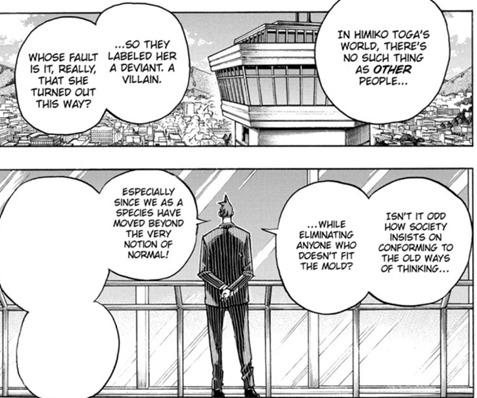
Wow! It’s almost like this was an entirely predictable outcome!
O My perennial gloating about the (MVA-era) MLA being justified and correct aside, it’s interesting and, I think, promising that Horikoshi made time to include that bit on quirk counseling here. Firstly, it reinforces the idea that Toga did not become a villain due to the actions of one discrete villain like AFO; she was failed by society at large, so simply offering her the sanctified blessing of The Sympathy of One (1) Teenager is not going to do a thing about the problems that created her, and will go on creating others like her unless real change happens in the attitudes of the current society.
(Of course, all of that is also true for Spinner, and we saw how the confrontation with the societal problems that created him went, thanks but no thanks, Shouji.)
Moreover, though, it’s yet another element that points in the direction of the Quirk Singularity Theory looming on the horizon. If quirks are getting stronger and stronger as generations pass (and we’ve got plenty of evidence that suggests that they are) and psychological issues like Toga’s are common in those with strong quirks (and I don’t see any reason for a professional counselor to misstate something like that[3]), then it follows that such issues will also become more common as quirks increase in strength. Indeed, an irresistibly strong desire to use one’s quirk would be a logical expression of Ujiko’s conclusion that quirks will eventually go out of control!
This is the dark side of Second’s conflation of a person’s intent with the term “quirk” back in Chapter 369. It’s a place where the translation of the word kosei as “quirk” obscures the sentence somewhat. Recall that the word Horikoshi uses translates more literally as “personality.” So, Second says that a strong intent is what makes a person fearsome, and this is why meta-abilities were given the name they were[4]: the power is merely a vessel, a weapon to be used to carry out the intent in question, a characterful, personalized expression of one’s inner will. In other words, a “personality.”
But the inverse also becomes true. If a quirk, a “personality,” is reflective of one’s will, then to suppress one’s quirks is to suppress one’s will. To condemn someone’s quirk becomes the same as condemning them. To label a quirk deviant is to label the person’s will deviant. And if a quirk grows too strong to control, then the will-as-embodied-by-the-quirk also goes out of control. Hence, Toga snaps after too many years of suppression.
So how does that problem get addressed? The MLA, of course, wanted free quirk use, because Destro foresaw a time when quirks would grow too powerful for suppression to be effective. Even radical self-acceptance and an even more radical restructuring of society are still just kicking that problem down the road, though, assuming they’d be effective at all—not that it looks like Hero Society is on the cusp of embracing that particular point of the MLA’s ideology regardless! Indeed, as Team Hero still regards the problem of quirks increasing in strength as “fringe thinking reserved for cults,” they don’t seem to have any intention at all of addressing the problem. Time will tell if the story itself will do so.
O It’s striking that even after some years of emotional abuse, Toga was still barefacedly begging her parents to please explain to her what made her so different from everyone else. It’s a telling parallel to her willingness to actively seek out Ochaco and Deku to ask their opinion on things, and makes it not terribly surprising that she reacts so negatively to being rebuffed by them. Her whole question in the wake of Jin’s death was whether heroes viewed villains as human—when heroes go on to reject her, like her parents did, of course she’d assume that it means those heroes also view her as inhuman.
Stray Notes
O ‘Eeeeeey, people picked up on the Death part of the Parade name this time! I notice it hasn’t been corrected in the online version of 375, though; I wonder if the volume release will fix it?
O One thing I wasn’t clear on from the leaks/scanlation—the former of which are too fuzzy, the latter too murky—but am very happy to see here is that the Himijin Horde is definitely visible on the horizon for Hawks. You can tell from the difference in the shading: fuzzy, gray, irregularly sized trees on the right and left, but a long black line of much more regular height in the center:

They’re heading for the Todorokis and Iida, too, of course, but Hawks is obviously the confrontation I’m most interested in. (Read: GET ‘IM. GEEEET ‘IM.) Very much hope we get to see that before Uraraka completely defuses this whole situation.
O Love the acknowledgement from both Ochaco and Tsuyu that Ochaco’s efforts here are late, and that’s worth an apology, worth Toga being upset about. I’m thrilled that the story is finally, explicitly folding villains into that idea expressed by Nedzu that it’s difficult but necessary for someone to be the first one to hold out a hand if society is to meaningfully advance. I extra love that Ochaco is holding out that hand while also taking a huge risk: offering her thoughts on why Toga’s having problems with making quirk-use-capable clones.
As I said about Chapter 382, Toga resolving that issue would be incredibly dangerous for Team Hero, and I love that Uraraka is still—despite being very aware of that danger—willing to try to help Toga with it. With no guarantee of reciprocity, with everything at stake, Uraraka still takes the time to carry on that conversation because it’s what her heart tells her is the right thing to do.
After all, if she can resolve Toga’s issue, that stands to win her back at least a degree of Toga’s faith, at which point a Toga-made clone of Shigaraki obliterating this whole stretch of countryside would no longer be what Toga wants.[5] More than the strategic considerations, though, it's plainly apparent that Toga struggling with Jin's quirk is causing her great anguish, and that's really what Uraraka wants to soothe.
Taking the talk-no-jutsu gamble is how Shinsou should have handled Machia; it’s how Deku should have been handling Shigaraki instead of drowning him in his Fist Ocean. I praised Mirio for making at least a game attempt at it, and Shouto took a crack at it before slipping back into castigation; if Spinner had been coherent enough to hold an actual conversation with Shouji, we might have gotten it there. This conflict, though, is where I expect the tactic to finally work, as Toga has both the emotional investment in Uraraka[6] and the presence of mind/free agency to actually respond. I can’t wait to see how it goes!
O Toga’s spitting-mad injunction that Uraraka not dare to pity her based on societal standards that never made room for Toga to begin with is an excellent echo of Jin's indignance that Hawks would dare to say Jin led an “unlucky” life, as well as Toga’s own fury at Curious for trying to paint her as miserable.
----------------- FOOTNOTES -----------------
[1] So far as I can tell, there’s not an officially recognized difference between “being poor” and “living in poverty”—they’re just different parts of speech describing the same condition—though it seems many people feel instinctively that there’s a difference in severity there. Still, I’ll stick with “poverty” in this case: while Uraraka’s family never seemed so destitute that they were worried about keeping a roof over their heads, we know that, as of the beginning of the manga, she was skipping meals to save money. I doubt she would have been so blasé about going hungry that it could be used as grist for comedic volume extras if she didn’t have prior experience with it, and not having enough money to have regular meals is right there in what it means to live under the poverty line.
[2] Elsewhere in this same angle, Deku’s frank empathy for and validation of Gentle and his motivations is what made Gentle’s return feel so much more earned compared to Nagant’s, and Shouto scolding Dabi for involving innocent people proved ineffective. Shouji, meanwhile, took a stab at validating the mob’s pain, but didn’t have a single word of sympathy for Spinner.
[3] You know, assuming she doesn’t turn out to have been secretly on AFO’s payroll or something.
[4] Setting aside Second’s rampant historical revisionism about the origin of the term, of course, because not a lick of what he says lines up with the actual story of the Mother of Quirks.
[5] Though, you know, the clone Shigaraki would probably still want it!
[6] Dabi’s emotionally invested in Shouto, but in an inverted way, not one that primes him to listen to anything Shouto has to say.
#bnha#bnha 392#bnha 393#toga himiko#uraraka ochaco#bnha endgame#bnha worldbuilding#chapter thoughts#my writing
56 notes
·
View notes